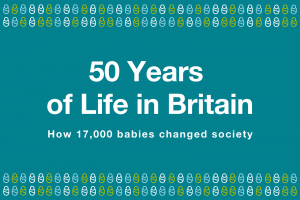Our last episode of the series examines how BCS70 and our study members have been faring during the pandemic and looks to the future of longitudinal research.
We find out more about the COVID-19 survey, sent to over 50,000 participants in five of Britain’s cohort studies, including BCS70, and we speak to study participants about their experiences of lockdown. We also find out more about the benefits of launching a new cohort study in the coming years.
Guests include:
- Professor Alice Sullivan, BCS70 director, who discusses her highlights and challenges running the study, and her hopes and dreams for its future.
- Professor Alissa Goodman, director of the Centre for Longitudinal Studies, on the COVID-19 survey and the future of Britain’s cohort studies.
- Study members, who share their COVID-19 lockdown experiences.
View and download the transcript for episode 6
Find out more:



 Our studies
Our studies







